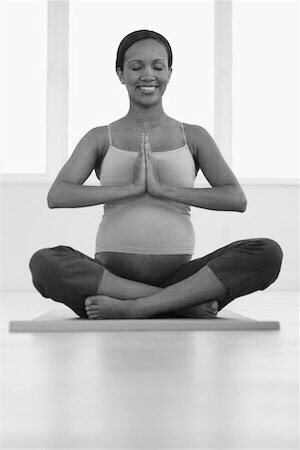Pregnancy Meditation by Mindworks
Pregnant women have to cope with a number of emotional and physical challenges. Hormonal changes can lead to mood swings, increased appetite and nausea, to name but a few. Meditation during pregnancy helps mothers-to-be cope with these changes by fostering relaxation and re-centering. In addition to enhancing peace of mind, meditation helps reduce the stress that is often experienced by pregnant women while improving their concentration.
Mindfulness in Pregnancy
Research has shown that women who practice mindfulness during their pregnancy enjoy decreased anxiety and depression levels compared to those who don’t. Mindfulness also seems to increase positive emotions. It’s easy to feel overwhelmed during pregnancy – there’s often a gradual buildup of stress and anxiety – and this doesn’t benefit the mother or the baby, not to mention the partner.
Mindfulness has proved so beneficial that the book Mindful Birthing by Nancy Bardacke, CNM won the 2014 American College of Nurse-Midwives Book of the Year and was a 2013 National Parenting Publications Award Winner. In an article published in Parents Magazine, Ms. Bardacke suggests that expecting mothers can learn to “Let the baby be your mindfulness teacher from the very beginning. When you feel the baby moving, stop and come back to the present moment, if you can. Feel the baby in your belly, feel the breath as the belly rises and falls, and just be present with your baby.”
How to meditate during pregnancy
Meditation has proved to be an effective tool that can help women deal with the stress and anxiety that may arise during pregnancy. Here are a few of the benefits of practicing mindfulness when pregnant:
1. A more positive outlook
There are many things that pregnant women might feel anxious about: their health, the infant’s health, the pain of labor, their ability to adjust to the new normal, lack of sleep, etc. Pilot studies have shown that women who attend a Mindfulness-Based Childbirth and Parenting course tend to be more in touch with their bodies before and during labor and have lower rates of post-partum depression. Also, fear of labor and other common fears decreased significantly, helping reduce the stressors that can cause premature birth. It’s even been shown that fear is affiliated with longer labor – a catch-22 that mindfulness can help resolve.
2. Relaxation
For women who are expecting, it can be hard to find “me” time. Many work as long as they possibly can – right up until the water breaks in some cases. And there’s everything else to think about too. Meditation gives pregnant women much-needed space for self-care. Women who already have their own meditation practice will find that the continuity is vital to their well-being. For new meditators, guided meditation can be especially helpful since they can relax, follow the soothing voice, and naturally tune in to their breath and physical sensations as guided. Mindworks App offers reliable, accessible guided meditation sessions that nurture well-being and relaxation.
3. Body awareness
There’s so much going on during pregnancy that it’s easy to get caught up in endless story lines and possible worst-case scenarios. Taking the time to remain present and take stock of one’s feelings and physical sensations can be an enormous help during pregnancy, labor, and afterwards. In an article about mindful birthing in Pregnancy and Newborn Magazine, a mother explains that for her, one of the most helpful aspects of mindfulness meditation was noticing—and even enjoying—the gap between contractions. “That space between contractions was genuinely restorative,” she says.
Body awareness can also be vital in helping pregnant women notice early on if something doesn’t feel quite right. This allows them to inform their health care team and have the problem attended to in as timely a manner as possible.
4. Meditation benefits the whole family
Some pregnant women are on their own, while others are part of a partnership or family unit. When there are two parents, other kids, relatives or close friends who are actively involved in welcoming the unborn child into the world, making a point of meditating together can strengthen the connection in a very meaningful way. After all, in a partnership or family, joys and anxieties that affect one member will also impact the others.
Light a candle, give voice to your wishes for health and harmony, and experience some mindful minutes with those you care about. At the end, join hands and share the love.

